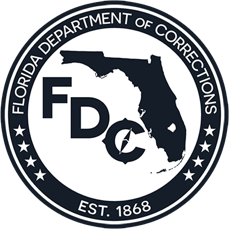2018
OFFENDER POPULATION JUNE 30, 2018
INMATES: 96,253
SUPERVISED: 166,157
INMATES: 96,253
SUPERVISED: 166,157
Pinellas Community Release Center is closed, and its inmates are moved to Suncoast Community Release Center.
Twenty facilities successfully undergo certified Department of Justice Prison Rape Elimination Act (PREA) audits during the fiscal year.
Community Corrections and the Office of Information Technology develop and implement a new Digitized Criminal Punishment Code Scoresheet that allows for easier data entry by criminal justice stakeholders. The new scoresheet is now being used by State Attorneys throughout the state.
Community Corrections receives statewide accreditation from the American Correctional Association (ACA).
In an effort to implement evidenced-based programs designed to reduce recidivism and increase offender success, Community Corrections staff conduct 84 Thinking for a Change (Cognitive Therapy) Programs statewide.
K2 OR SPICE

An increasingly disturbing and deadly problem plaguing Florida correctional institutions is inmates using synthetic cannabinoids, bath salts, and opiates, also known as K2 or Spice. (These drugs are smuggled into the institutions via visitors and yes, even staff.) In response, FDC creates and implements a synthetic drug campaign to educate and inform inmates about the dangers of synthetic drug use. This campaign is multi-faceted in its approach to reach inmates, staff, visitors and volunteers. The campaign includes posters, pamphlets and videos for inmate distribution; new training materials for staff; as well as the professionally produced "Contraband Bob" video for the public.
CORRECTIONAL BEHAVIOR HEALTH CERTIFICATION
The FDC is the first correctional agency in the nation to have staff issued the Correctional Behavior Health Certification facilitated by the ACA. The purpose of the examination for the Correctional Behavioral Health Certification is to ensure a staff member's knowledge of national standards guidelines, legal and ethical principles, relevant security regulations, and the role of correctional professionals associated with behavioral health services.
High-definition audio and video monitoring equipment with live-stream capabilities is installed on all FDC transport buses. Cameras are installed in several areas, both inside and outside the transport vehicle to monitor inmate and staff during transports. Additionally, all FDC transport buses are now required to have highly visible roof top identifiers (FDC and vehicle number), which can be seen from the air.
The Corrections Foundation is reauthorized through statute. As the direct-support organization for the FDC, the Corrections Foundation supports FDC's officers, staff, and programs through a variety of initiatives such as Fallen Officers Fund and the Employee Assistance Program, which provides help to employees in times of crisis.
The FDC collaborates with the Department of Health (DOH) to acquire free vaccines under Section 317 of the Public Health Act. FDC already receives free influenza and TDAP (Tetanus, Diphtheria and Pertussis) vaccines, and plans are underway to expand the program to include pneumococcal and other vaccines. This new partnership results in savings of $177,788 in FY 17-18. When fully implemented, this collaboration is expected to result in a cost avoidance of up to $1 million annually.
The FDC expands its use of tele-psychiatry. This program not only provides increased access to healthcare for inmates, but also lessens the burden of transportation and staffing requirements necessary for specialty care appointments.
 Former Secretary Michael W. Moore dies suddenly in a car accident on April 16, 2018 in Victoria, Texas at the age of 69. Appointed by Governor Jeb Bush, Moore served as Secretary from 1999-2003.
Former Secretary Michael W. Moore dies suddenly in a car accident on April 16, 2018 in Victoria, Texas at the age of 69. Appointed by Governor Jeb Bush, Moore served as Secretary from 1999-2003.
Community Corrections’ Alternative Sanctions Program (ASP) becomes law. It allows the court to administratively handle specified technical violations of certain non-violent offenders without going through the formal violation hearing process and clogging court dockets. This program has reduced the number of offenders revoked for a technical violation and returned to prison by several thousand each year, while still holding them accountable for their violations.
Wakulla CI Annex opens an Outpatient Residential Treatment Continuum of Care program. This specialized program provides protective housing and more treatment units for inmates with serious mental impairment associated with a historical inability to successfully adjust to living in the general inmate population. It features a 240-bed Diversion Treatment Unit for inmates with severe mental illness; a 240-bed Secure Treatment Unit for inmates with severe mental illness and behavioral issues; 26 beds for inmates with cognitive issues, such as dementia, mild traumatic brain injury or other neurocognitive disorders; 12 isolation management rooms; and an 80-bed inpatient unit to support the program.
 FDC’s fleet unit purchases 166 new vehicles including Bluebird buses, passenger vans, sedans, K-9 trucks, and SUVs. In addition, 20 pre-owned vehicles from various auctions are purchased including vans, sedans, a pickup truck and a semi-tractor trailer. FDC also buys 50 rugged terrain vehicles which are used for perimeter security patrols and each institution received specialized training to use the new equipment.
FDC’s fleet unit purchases 166 new vehicles including Bluebird buses, passenger vans, sedans, K-9 trucks, and SUVs. In addition, 20 pre-owned vehicles from various auctions are purchased including vans, sedans, a pickup truck and a semi-tractor trailer. FDC also buys 50 rugged terrain vehicles which are used for perimeter security patrols and each institution received specialized training to use the new equipment.
 The Farm & Edible Crops Program (FECP) grows millions of pounds of fresh vegetables each year to supplement the food service master menu. This year, FECP staff begin a consolidation plan to reduce costs without severely impacting harvest productions by closing smaller farms and centralizing and relocating agricultural equipment and supplies. The program benefits the inmate population by providing an opportunity to learn agricultural skills for employment upon release. In FY17-18, approximately 4.1 million pounds of fresh produce is harvested and distributed to the institutions. Crop production is valued at approximately $2.7 million.
The Farm & Edible Crops Program (FECP) grows millions of pounds of fresh vegetables each year to supplement the food service master menu. This year, FECP staff begin a consolidation plan to reduce costs without severely impacting harvest productions by closing smaller farms and centralizing and relocating agricultural equipment and supplies. The program benefits the inmate population by providing an opportunity to learn agricultural skills for employment upon release. In FY17-18, approximately 4.1 million pounds of fresh produce is harvested and distributed to the institutions. Crop production is valued at approximately $2.7 million.
FDC completes 297 roof replacements in addition to minor structural repairs resulting from Hurricane Irma. FDC also processed more than 1,200 property damage claims resulting from Hurricane Irma and streamlined the process using a web-based system to track damage estimates that avoids duplication.
To recruit new correctional officer staff, FDC holds two large-scale, same-day hiring events attracting thousands of potential candidates. During this time, the security recruitment team processes 16,141 new applicants, successfully hiring 4,399 correctional officers.
HURRICANE MICHAEL
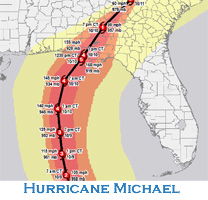 October 10, 2018, Category 5 Hurricane Michael hits the panhandle with winds reaching 161 mph. This historic storm forces closure of Gulf CI for an extended time, along with temporary closure of other facilities. No offenders in FDC custody were seriously injured or died during Hurricane Michael, which prompted the evacuation of more than 5,000 inmates to safety. FDC receives national recognition for these efforts and is asked to teach emergency management at the American Corrections Association’s national conference.
October 10, 2018, Category 5 Hurricane Michael hits the panhandle with winds reaching 161 mph. This historic storm forces closure of Gulf CI for an extended time, along with temporary closure of other facilities. No offenders in FDC custody were seriously injured or died during Hurricane Michael, which prompted the evacuation of more than 5,000 inmates to safety. FDC receives national recognition for these efforts and is asked to teach emergency management at the American Corrections Association’s national conference.
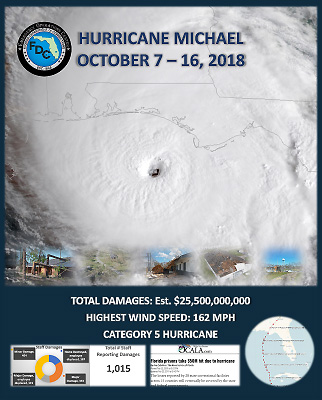
Gulf Correctional Institution and Annex in the aftermath of Hurricane Michael:

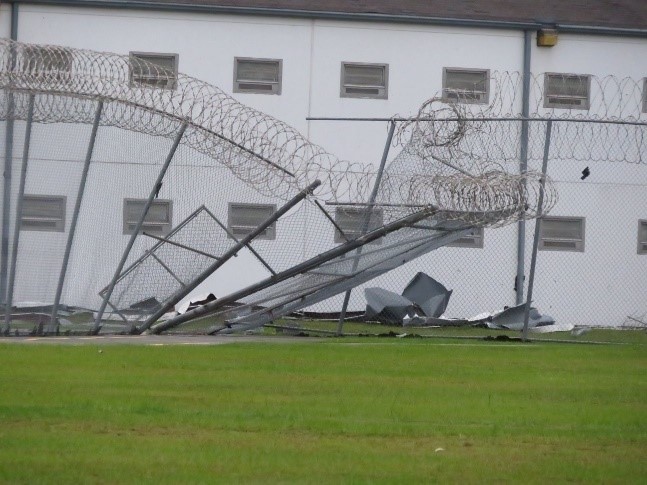
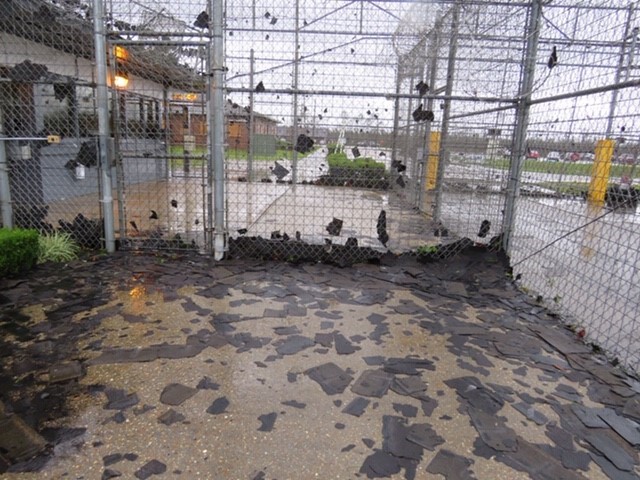
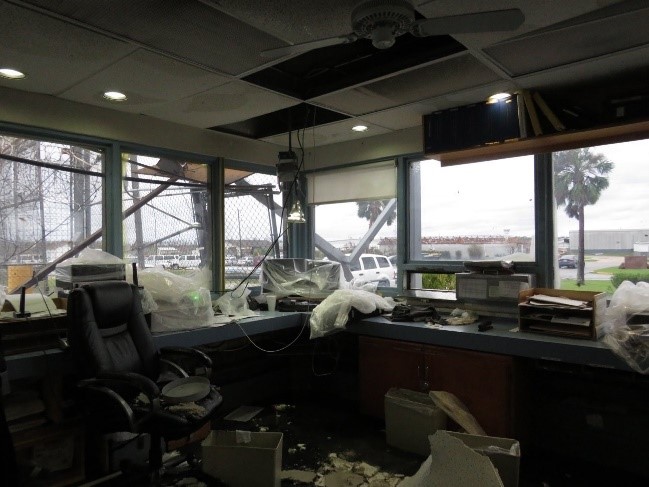
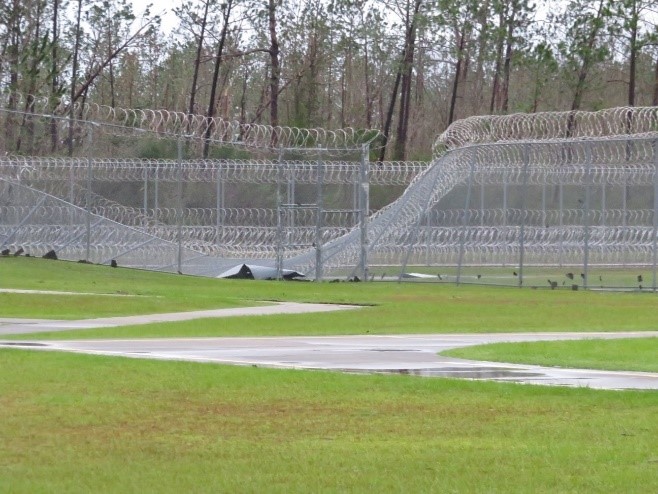

Maintenance staff complete substantial repairs and modifications to nine of the Department's 20 ADA facilities as a result of a legal settlement agreement and will continue making repairs to all 20 of the Department's ADA facilities statewide over the next fiscal year.
The FDC begins making available a variety of multimedia services to inmates through both an interactive kiosk, available in each general population housing unit, and secure tablets. These services are geared toward enhancing family connections, expanding educational opportunities, and incentivizing positive inmate behavior at no cost to the Florida taxpayer.
FDC establishes partnerships with outside educational organizations in 2017 and 2018, resulting in 688 additional career technical educational slots per year. The partnering educational facilities include seven colleges and the Home Builders Institute.
The Incentivized Prison is a voluntary, specialized facility that gives inmates the opportunity to complete their sentences within a population of focused, discipline-free individuals if they meet eligibility criteria. This initiative is implemented at Everglades CI in 2018 with a population of 1,700 inmates, with plans to expand the initiative over the following year to several more facilities. Incentivized prisons can provide additional benefits, such as extra visitation, to promote good behavior and as an incentive to inmates.
VOTING RIGHTS RESTORATION
 Amendment 4, also known as the Voting Rights Restoration for Felons Initiative, is passed by ballot initiative on November 6, 2018. The proposition restores the voting rights of Floridians with felony convictions (excluding murder and sexual offenses) after they have completed all terms of their sentences, including parole or probation, and payment of all fines, fees and restitution. FDC collectively forms a taskforce to develop a process ensuring all inmates and offenders are provided necessary information relating to this proposition.
Amendment 4, also known as the Voting Rights Restoration for Felons Initiative, is passed by ballot initiative on November 6, 2018. The proposition restores the voting rights of Floridians with felony convictions (excluding murder and sexual offenses) after they have completed all terms of their sentences, including parole or probation, and payment of all fines, fees and restitution. FDC collectively forms a taskforce to develop a process ensuring all inmates and offenders are provided necessary information relating to this proposition.
The recidivism rate for inmates rises slightly to 24.7% (for inmates who were released in 2015), meaning for those inmates who were released in 2015, 24.7% of them returned to a Florida state prison within a three-year period.
There are two executions in 2018. They are:
- Eric Branch (almost 24 years on death row); and
- Jose Jimenez (20 years on death row).
- 1821-1845
- 1868-1876
- 1877-1895
- 1900-1919
- 1921
- 1922-1924
- 1927
- 1928-1931
- 1932 | CHAPMAN
- 1933-1935
- 1936-1939
- 1940-1945
- 1946-1949
- 1950-1955
- 1956-1961
- 1962 | WAINWRIGHT
- 1963-1965
- 1966-1969
- 1970-1975
- 1976-1979
- 1980-1986
- 1987 | DUGGER
- 1988-1990
- 1991 | SINGLETARY
- 1992-1995
- 1996-1998
- 1999 | MOORE
- 2000-2002
- 2003 | CROSBY
- 2004-2005
- 2006 | MCDONOUGH
- 2007
- 2008 | MCNEIL
- 2009-2010
- 2011 | BUSS
- 2011 | TUCKER
- 2012 | CREWS
- 2013-2014
- 2014 | JONES
- 2015-2018
- 2019 | INCH
- 2020-2021
- 2021 | DIXON
- 2022-Today
- Population Summary Table

